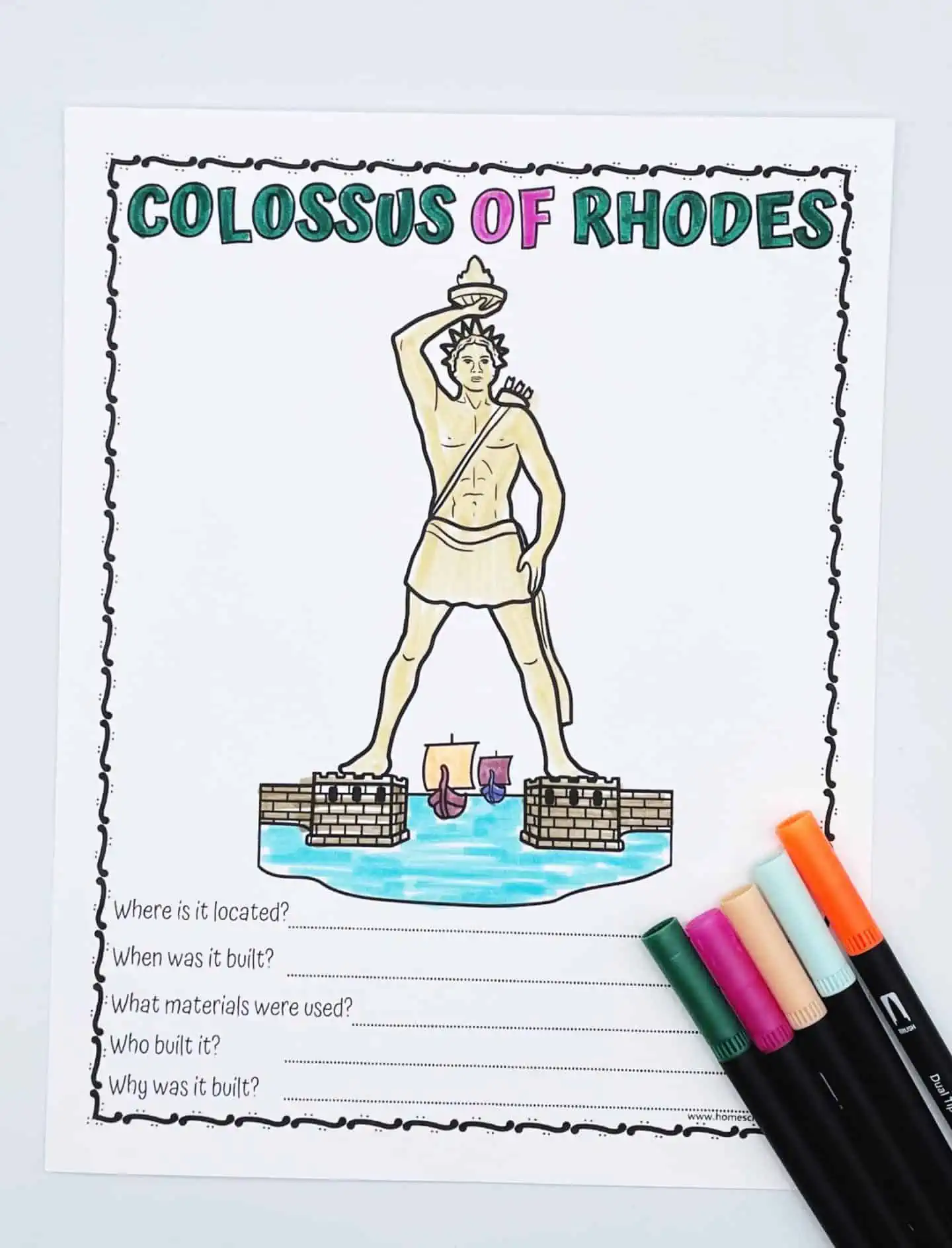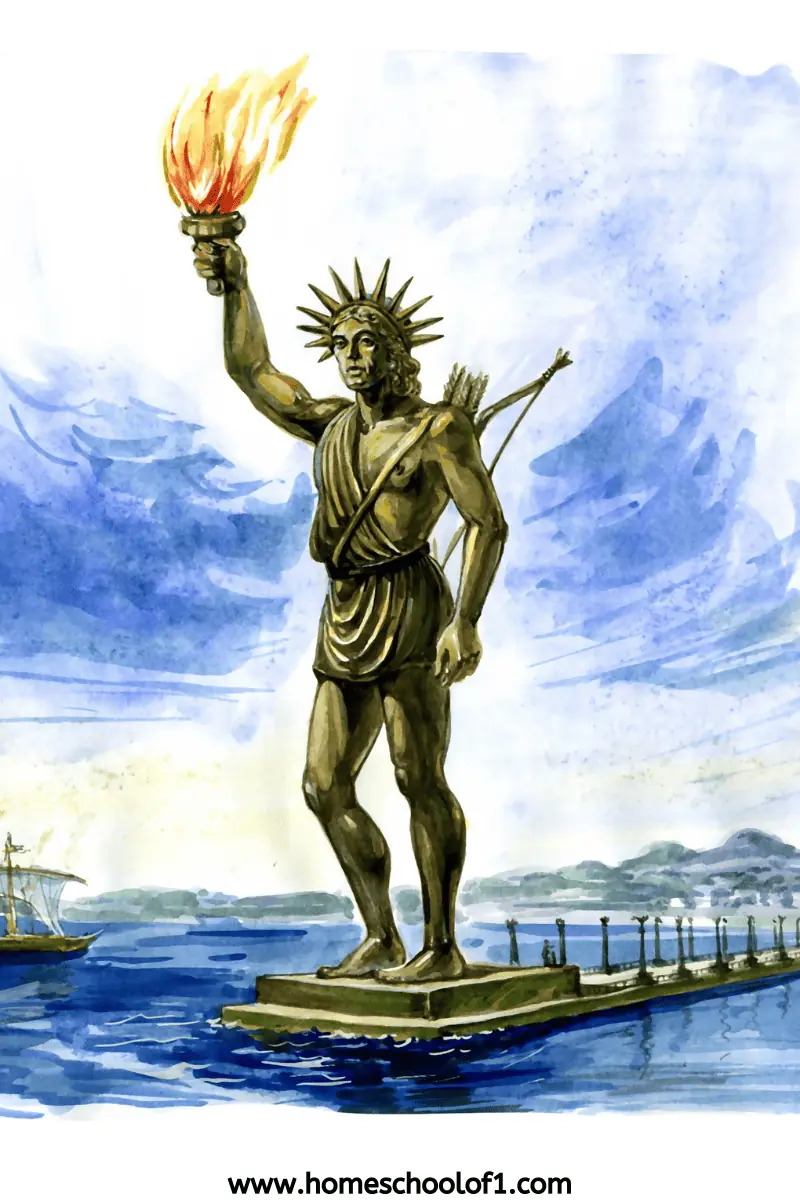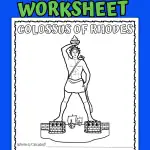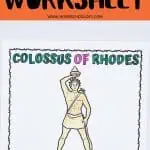Colossus of Rhodes Worksheet & Fun Facts for Kids
Uncover the majesty of one of the ancient world’s most awe-inspiring statues with this free Colossus of Rhodes worksheet.
With this free geography printable, you will embark on a journey to explore the legendary Colossus of Rhodes, situated in ancient Rhodes (modern-day Greece). This colossal statue, dedicated to the sun god Helios, stood as a symbol of power and resilience.
Through this worksheet, you will discover intriguing facts about the history, design, and cultural significance of the Colossus of Rhodes. From its towering height to its intricate construction, each aspect of this ancient wonder showcases the skill and craftsmanship of the Hellenistic period.

**This post may contain affiliate links. As an Amazon Associate and a participant in other affiliate programs, I earn a commission on qualifying purchases.**
Whether you are studying ancient Greek mythology or simply captivated by monumental sculptures, this Colossus of Rhodes worksheet is an invaluable educational resource. It combines geography, history, and cultural exploration to ignite your curiosity and expand your knowledge of this extraordinary wonder of the ancient world.
Interesting Colossus of Rhodes facts for kids
- The Colossus of Rhodes was a gigantic statue of the Greek god Helios. Also known as the Sun God. It was one of the Seven Wonders of the Ancient World.
- The statue was built on the island of Rhodes in Greece around 280 BC. It was constructed to celebrate the victory of Rhodes over an enemy army.
- The Colossus of Rhodes was made entirely of bronze, a metal alloy composed mainly of copper. It stood approximately 98 feet (30 meters) tall, which is about as high as a 10-story building.
- The statue was created by the Greek sculptor Chares of Lindos. It took him and his team of workers 12 years to complete.
- The Colossus of Rhodes stood at the entrance of the harbor. With its legs on either side of the harbor mouth, allowing ships to pass underneath.
- The statue was known for its impressive height and grandeur. It was said to have been visible from far away, guiding ships into the harbor.
- Unfortunately, the Colossus of Rhodes stood for only a relatively short time. It was destroyed in an earthquake in 226 BC, which caused it to collapse.
- After its collapse, the statue lay on the ground for nearly 900 years. Many people visited the ruins to see the fallen Colossus.
- The remains of the statue were eventually sold as scrap metal in the 7th century AD by invading Arab forces. It is said that it took 900 camels to carry away all the pieces.
Continue learning with our free continent of Europe worksheets.
Colossus of Rhodes research
Welcome to the fascinating world of the Colossus of Rhodes!
Get ready to embark on a colorful journey through time and uncover the secrets of the Colossus of Rhodes.
As you grab your coloring pencils, let’s dive into the history of the Colossus of Rhodes and discover the answers to some intriguing questions.
These are the questions the kids will need to answer on the Colossus of Rhodes worksheet:
Where was the Colossus of Rhodes located?
The Colossus of Rhodes was located on the island of Rhodes, Greece. It stood at the entrance of the harbor.
When was the Colossus of Rhodes built?
The Colossus of Rhodes was built around 280 BC.
What materials were used in making the Colossus of Rhodes?
The statue was made primarily of bronze, which is an alloy of copper. However, it is worth noting that there is some debate among historians regarding the exact materials used.

Who built the Colossus of Rhodes?
The Colossus of Rhodes was built by the Greek sculptor Chares of Lindos. He led a team of workers who constructed the statue.
Why was the Colossus of Rhodes built?
The Colossus of Rhodes was built to celebrate the victory of Rhodes over an enemy army. It served as a symbol of the city’s power and as a dedication to the Greek god Helios, also known as the Sun God.
What happened to the Colossus of Rhodes?
The Colossus of Rhodes, one of the Seven Wonders of the Ancient World, met a tragic fate. Here’s what happened to the Colossus:
- In 226 BC, a powerful earthquake struck the island of Rhodes. This earthquake, estimated to be around magnitude 7.0 to 7.5, caused significant damage to the island and led to the downfall of the Colossus. The statue collapsed and was left in ruins.
- After the earthquake, the fallen remains of the Colossus of Rhodes lay on the ground for nearly 900 years. Many people visited the ruins to witness the colossal fallen statue.
- In the 7th century AD, during the Arab invasion of Rhodes, the remains of the Colossus were sold as scrap metal. It is said that the broken pieces were transported away from the island on the backs of 900 camels.
- The dispersed fragments of the statue were eventually melted down and repurposed, losing their identity as parts of the Colossus of Rhodes. The bronze material was valuable, and it was likely reused for various other purposes.

Due to the destruction and dispersal of the statue, no significant remnants or recognizable parts of the Colossus of Rhodes have survived to the present day.
Only historical accounts, artistic depictions, and descriptions passed down through generations provide insight into the appearance and significance of this once-magnificent statue.
You will also enjoy our Greek mythology coloring pages.
Download the free Colossus of Rhodes worksheet
If you are learning all about the wonders of the world you can download all 14 worksheets. With the new and ancient wonders of the world worksheets for a small fee.
Need to print later? Add this to your Pinterest board or share it on Facebook. You’ll have it handy whenever you’re ready to use it!
Ready to grab your free printable? Just pop your name and email into the form below, and it’s all yours!
Additional wonders of the world worksheets
Last Updated on 31 March 2025 by Clare Brown




